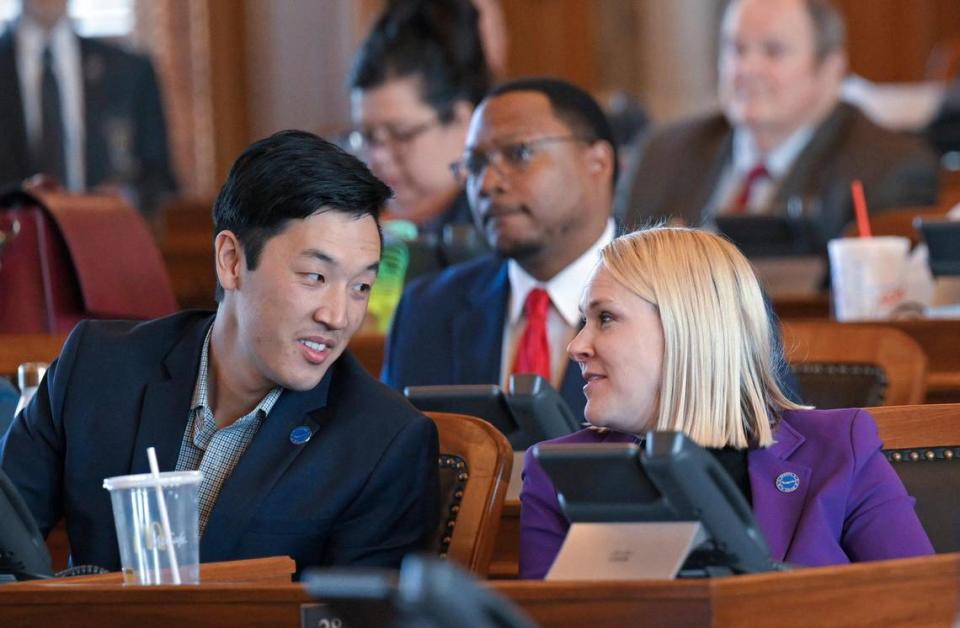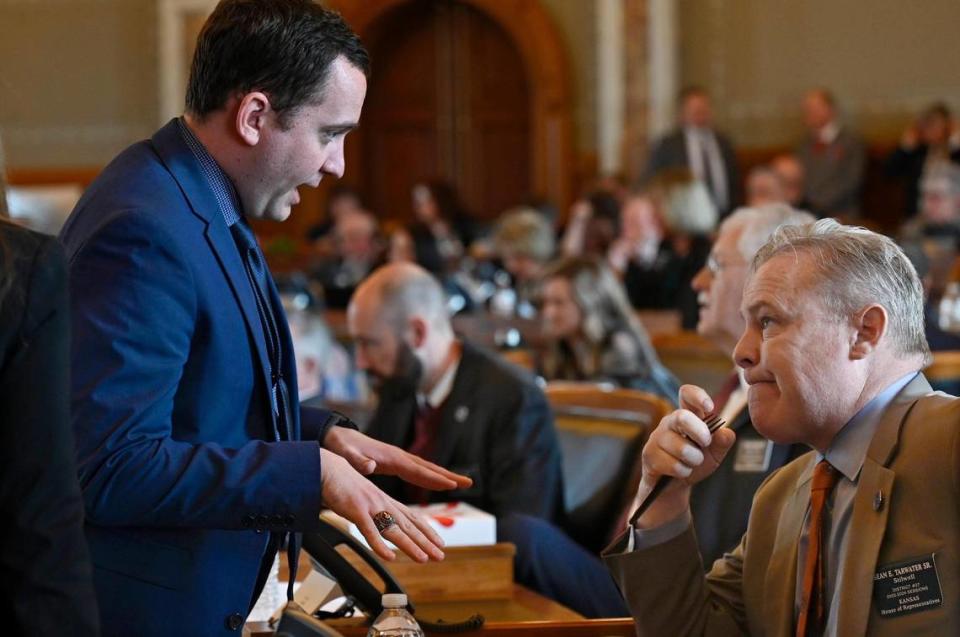Kansas lawmakers are among worst paid in nation. Some say it impedes true representation
Rep. Lindsay Vaughn can barely afford to live in the Overland Park district she represents.
The second term Democrat from Overland Park was a volunteer manager at a Kansas City area nonprofit when she ran for the Legislature. But after one year working two full-time jobs, the emotional and physical strain proved to be too much.
Now, she balances her elected position with contract work out of session. To make ends meet, she took on a part-time retail job during the holidays last year.
Her take-home pay last year was less than $30,000. According to the U.S. Census Bureau, median rent in Overland Park is $1,248 monthly, or roughly half of Vaughn’s income over a year.
“This job was not built for young people and it’s kind of a fight to make it work,” the 28-year-old lawmaker said.
Vaughn views service in the Legislature as an honor. But she’s approaching a crossroads where she’ll have to decide how long she can rely on that job in combination with contract work, short-term gigs and family support.
“It’s single-handedly the one thing that makes this job unsustainable in the long run,” Vaughn said.
Her situation is not unique.

Since 2009 Kansas lawmakers have been paid $88.66 per day. Assuming an eight-hour work day lawmakers make roughly $11.08 per hour, not including the per diem received for travel and living expenses in Topeka.
But oftentimes the hours far exceed the traditional eight-hour day once constituent services on unpaid days, evening meetings and late night debates are taken into account. Furthermore, lawmakers are expected to continue serving their constituents year-round even though they are only paid for the 90-day legislative session.
As a result, Kansas may be paying below the $7.25 per hour minimum wage to the officials tasked with determining the policies and laws of the state.
In addition to the daily pay, lawmakers receive $157 per diem for lodging and meals in Topeka and a $354 allowance in 20 pay periods for expenses incurred serving constituents outside the session.
Assuming a 90-day legislative session, Kansas lawmakers are paid $7,979 annually plus $14,130 in per diem. Combined with the allowance Tom Day, director of Legislative Administrative Services, said the average legislator is paid about $29,000 annually before taxes and benefits. The Legislature is part-time.

That’s still lower than Missouri lawmakers, who are also part-time, and earn a base salary of $36,813. They also receive a $124 per diem when they are in Jefferson City.
The Star spoke with more than a dozen current and former Kansas lawmakers from both parties about the impacts of the state’s pay rate. What emerged is a picture of a system that prioritizes independently wealthy, retired candidates over younger or low-income Kansans. Those who entered the Legislature spoke of working extreme hours in several jobs to make ends meet and financial instability as a constant threat to their ability to stay in office.
In the past nine years, Rep. Blake Carpenter, the 32-year-old Republican speaker pro tem from Derby, has had moments where he was fully unemployed and others when he juggled four jobs at once.
Rep. Christina Haswood, a 28-year-old Lawrence Democrat, applied to be a substitute teacher and had to use her community’s food bank a few months ago.
Inflation has risen 42% since lawmakers last received a pay raise in 2009, but efforts to increase legislative pay have historically been stymied because they’re viewed as politically toxic.
However, this year leadership in the Kansas House and Senate is backing an effort to establish a commission and give it the authority to change compensation.
“It’s the political fear of just trying to vote for a pay increase,” said Rep. Tom Sawyer, a 64-year-old Wichita Democrat who has pushed for raises in the past. “When people realize what we’re paid I don’t think it’s as big an issue as most people think.”
“Constituents already think we’re making like $100,000.”
House and Senate leadership are now backing a new effort to address legislative pay without asking lawmakers to vote directly on their own raises.
On Thursday the House passed a proposal put forward by lobbyist and former lawmaker Jason Watkins on behalf of the Greater Wichita Chamber of Commerce. It now goes to the Senate.
The proposal would create a commission to study legislative pay every four years and set a rate for lawmakers. The current Legislature could vote to reject any pay rate recommended by the commission but would not need to vote to accept it.
“It completely takes away the argument that legislators are enriching themselves,” Watkins said.
Democratic Gov. Laura Kelly, a former state senator, is likely to sign the bill, her office indicated in a statement.
“The Governor believes the commission is a very good idea as it’s one way the Legislature can achieve a fair salary structure that encourages more Kansans to participate in the democratic process,” Kelly spokeswoman Brianna Johnson said.

Lawmakers call low pay a barrier
Peverill Squire, a University of Missouri professor who studies legislative pay, said the makeup of Kansas’ Legislature is, to a certain extent, a direct result of compensation.
“Where you pay small sums of money you tend to have more legislators who are retired from their working life and have the time and financial resources to devote themselves to legislative service,” Squire said.
Squire said his research has shown Kansas is among the lowest paid in the nation, and has one of the largest poorly paid Legislatures.
Among the highest in the nation, New York lawmakers are paid $110,000 annually and California lawmakers make $119,702 annually, according to 2022 salary data from the National Conference of State Legislatures. But lawmakers for these states are in session year-round.

The only state in the country that does not pay its legislators a salary is New Mexico — though that state still provides a per diem and retirement benefits.
Rep. Tory Blew, a 29-year-old Great Bend Republican, says she’s seen more young members enter the Legislature since she took office in 2017. But among those representing rural Kansas, she said, she is among the youngest by far.
She ran for office right out of college and believes that if she had waited she likely never would have joined the Legislature. Her decision, she said, limited her ability to buy a home as early as she would have liked.
“It is a huge pay cut when you’re trying to start a family,” she said. “Tell me what employers allow you to be gone for four months, five months.”
Blew’s story is common among younger lawmakers. The decision to join the Legislature requires major financial sacrifices, especially for a Kansan who is starting a family and in their peak wage earning years.
The average age of a current Kansas lawmaker is just over 57, according to The Star’s analysis based on legislators’ birth dates published in Hawver’s Capitol Report. Of the 160 people in the Legislature only four lawmakers are in their 20s, while 12 are in their 30s.
Some lawmakers said this has made it harder to gain traction on issues that are more accepted or felt by younger generations like marijuana legalization and college debt.
“We just kind of grew up in a different society than many of them did,” said Rep. Rui Xu, a 33-year-old Westwood Democrat. “Many of them did not grow up with the same college loan debt issues that we have gone through. A lot of them have not been through school as recently. A lot of them are not interacting with the world and technology like many of us are.”

Lawmakers advocating for change say Kansas’ pay rate operates as a self-selecting system preventing Kansans with young children, those who make too much and those who make too little from entering the body.
“It’s a barrier for working moms. It’s a barrier for plumbers or blue collar folks,” said Rep. Nick Hoheisel, a 37-year-old Wichita Republican.
But Eric Hansen, a political science professor at the University of Loyola in Chicago, and Nick Carnes, a political science professor at Duke University, studied the issue in 2016 and found that there is little empirical evidence that increased pay results in a more financially diverse legislature. The cost of campaigning, they found, is a powerful deterrent to lower income candidates.
“If you raise pay you’re going to get more white collar folks running for those offices,” Hansen said. Essentially, he said, higher pay will attract individuals who are already making a substantial amount of money. “It’s going to get people to come out of the woodwork to run because they can see ‘this isn’t going to set me back as much.’”
Hansen said it’s possible an increase from Kansas’ already unusually low pay to something more moderate could result in a mix of white and blue collar candidates.
Carnes said the increased pay may result in more “professionals” running for office.
In the November 2022 election, 65 of 125 House races were uncontested. Republicans and Democrats argue a pay increase would change that dynamic, bringing more competition to districts.

“It gives those constituents the ability to truly elect who is going to best represent them and gives them more options to choose from, a broader range to choose from,” Carpenter said of the prospect of increased pay.
But some worry a pay increase will change the motivations of lawmakers. Rep. Pat Proctor, a Fort Leavenworth Republican, said that Kansas benefits from its part-time Legislature, which means lawmakers spend time working in other professions in their districts for most of the year unlike Congress.
“Turning this from a public service into a job is a bad move for Kansans and a bad move for Kansas,” he said.
But many advocating for a raise said there should be a middle ground that provides lawmakers with enough money to support themselves while not creating an incentive for career politicians.
“People need to be paid without the incentive of making this a cushy career where you’re living off the taxpayer dime,” said Steve Brunk, a former Republican lawmaker from Wichita.

‘The margins of my life are tight’
Lawmakers spend the first three to four months of the year in Topeka. For many, this makes it difficult or impossible to keep a full time job.
Those that keep a full-time job describe exhausting hours additional work on the weekends and evenings. Many opt to cobble together contract work and part time jobs in the summer and fall, but that brings a high level of uncertainty.
While access to the state’s retirement plan and healthcare is an added benefit, the cost of the program might exceed what a lawmaker gets paid when the Legislature isn’t in session. As a result, some lawmakers need to pay the state for the excess costs at the end of the year.
Day, with Legislative Administrative Services, said he’s seen these costs range from $100 to $9,000 for individual lawmakers.
After he had his first child, Carpenter said, he owed Kansas $7,000 at the end of the calendar year for health insurance costs.
“What job in America makes you pay your employer to have a job?” Carpenter said.
Since joining the Legislature at 23, Carpenter said, there were often sessions where he would work from 7 a.m. until 5 p.m. in the Capitol before returning to his hotel where he worked until 2 a.m. on his day job.
He said the cost of benefits and low pay served as an incentive for him to join the Air National Guard.
“I always wanted to join the military but after looking at their benefits and other things offered it just made so much sense,” he said. “It allowed me to make this more doable.”
Carnes, the Duke University researcher, said the part-time work and low pay acts as a disincentive for lawmakers to do the jobs expected of them — like responding to constituent emails and actually reading the bills before taking a vote.
“When we compensate it like a part-time job, people, understandably, treat it like a part-time job,” he said.
The lengths existing members go to to balance their existing jobs and the Legislature, Carnes said, raises questions about moral working conditions.
“If you’ve got an organization that spends that much money and makes decisions that are literally life and death you don’t want to cut labor costs,” he said.
Wichita Mayor Brandon Whipple, a Democrat who served seven years in the Kansas House, said he picked up teaching jobs outside the legislative session and stayed home with his kids.
“I had to look for opportunities to leverage my formal education to try to get a side hustle,” Whipple said. Though he left the Legislature to run for mayor in 2019, he said he would have likely left earlier if one of the colleges he taught at offered him a full-time position.
And for lawmakers who own their own business the part-time nature of the Legislature is still challenging.
John Whitmer, a former lawmaker who is now a conservative talk radio host in Wichita, said his business profits took a major hit during the Legislative session. His online retail business, he said, was just him and his wife and so 50% of their workforce left for a large chunk of the year.
“We do online retail so when we’re not here listing we’re not selling,” he said.

Sen. Kristen O’Shea, a 30-year-old Republican from Topeka, said she has to let work fall by the wayside and depend on her business partner.
“It’s kind of looked down upon to be working on your business while you’re in session,” she said, noting that if she spends too much time on her business during the session it will turn into negative campaign material.
And it’s even more tenuous with young children, she said.
O’Shea said she comes out behind financially after a legislative session because of the money her family has to spend on child care for her 18-month-old son.
Xu said his entire legislative salary goes to pay the cost of child care for his 3-year-old daughter. He said a recent ruling from the Kansas Governmental Ethics Commission allowing campaign funds to be used on child care has lightened the load.
“Doing this job, the margins of my life are tight,” Xu said. “But it is a tremendously worthwhile job.”
The challenges are similar for single lawmakers who don’t have a spouse helping to cover household expenses.
Haswood, a Lawrence Democrat, said she worked in the Douglas County COVID-19 call center while campaigning. She launched her campaign just after finishing graduate school.
Haswood, who has earned national attention for her Tik Tok page, said she has found paid speaking engagements at colleges and is participating in a fellowship.
“As a sitting elected official I’m not rich, I’m just like everyone else trying to make it by,” Haswood said. “A lot of the issues I fight for are still impacting my life every day.”

‘It was always elections’
On various occasions over the past decade and a half lawmakers have sought to increase their compensation. But more often than not the proposals are dead on arrival.
In 2014, Sen. Virgil Peck, a 63-year-old Havana Republican who was in the House at the time, proposed a bill that would roughly double pay for lawmakers.
In the hearing for the bill, Peck said he was the only public proponent. But when he talked to lawmakers in the hallway they wanted to see a pay raise but told him they couldn’t support the bill.
“It was always elections,” he said. “Even my next election in 2016, it was an issue.”

Eric Stafford, a lobbyist for the Kansas Chamber of Commerce, said in order for compensation to increase the driving force behind it needed to be lobbyists, not lawmakers.
“There should be united support from all organizations that it is a deterrent for people and for individuals of all political stripes to run,” Stafford said.
While previous attempts to address legislative pay have not been able to gain support in both chambers, Senate President Ty Masterson, an Andover Republican, said last week that the proposed commission would be the best way to address the situation.
“Having a third party entity look at it is probably the most appropriate way to do it versus the Legislature voting on their own raises, or never voting on it because we’re afraid of something,” Masterson said.
Supporters are hoping the bill will be a potential solution to the political pitfalls associated with pay raises.
“People get very frustrated whenever individuals vote to give themselves a pay increase so I think what this does is allow that third party to really look at what is a reasonable rate and we’re not doing it ourselves,” Carpenter said. “It’s a group of individuals that have no skin in the game but want to do the right thing.”

